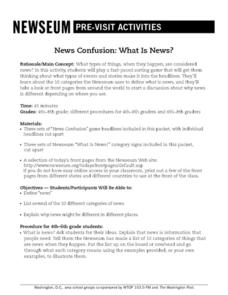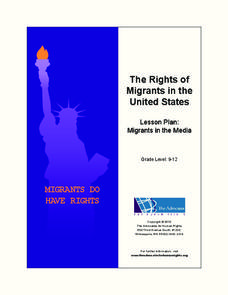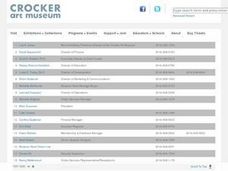PBS
How to Teach Your Students about Fake News
What media literacy skills do people need to evaluate a news source? Scholars listen to and discuss an NPR story about how fake headlines often dupe young people and adults alike. Next, they study news stories, using a fact-checking...
West Virginia Department of Education
Intelligence of Authentic Character - News Coverage and John Brown's Raid
The resource, a standalone, shows how news coverage of John Brown's Raid began when the event happened and how that reporting shaped perception in West Virginia history. The resource includes interesting anticipatory discussion...
Facing History and Ourselves
Verifying Breaking News
The attempts of journalists to verify the events surrounding the shooting of Michael Brown take center stage as individuals analyze three of the initial newspaper accounts of the story. The whole class discussion then focuses on the...
Social Media Toolbox
Social Media Survey
Survey says ... social media is here to stay! How do the pupils in your school use social media? Using lesson four from a 16-part series, The Social Media Toolbox, learners study surveys and create their own. The resource includes...
Facebook
Online Presence
What happens when an online post gets the wrong kind of attention? Learners evaluate the good, the bad, and the occasionally ugly side of social media posting with a instructional activity from a vast digital citizenship series. After...
Constitutional Rights Foundation
Understanding Fake News
Fake or fact? Learners must decide while looking at two published "news" stories. A reading about why fake news exists and a checklist on how to evaluate sources rounds out the activity.
Curated OER
Lesson: Unmonumental: Yesterday's News
Upper graders are tasked with developing a social consciousness as they analyze the impact of the news media. They view a presentation depicting various media events in order to understand threshold moments in history. There are three...
TED-Ed
How to Choose Your News
How do you get the truth unfiltered by middlemen? Tune into various sources and note the differences is the suggestion in a short video that begins by providing examples of how media gatekeepers have manipulated information and how those...
Curated OER
News or Propaganda?
What is considered news vs. propaganda? Learners will discuss objectivity and press responsibility while exploring these two concepts. They work in small groups to explore the article in-depth, guided by reading comprehension and...
University of Maine
Healthy Relationships
A three-part Healthy Living Curriculum begins with a look at how self-esteem impacts relationships. Individuals identify their own positive qualities and then consider how statements on social media may impact self-esteem.
Newseum
News Confusion: What Is News?
Use headlines to help your learners understand what news is. First, present a list of categories to your class. Then instruct small groups to play a game in which they sort headlines into the categories. Discuss the result and examine...
American Press Institute
Media Literacy: Where News Comes From
What actually happens at a press conference? Make sense of the mayhem with a mock press conference activity designed to promote media literacy. Individuals participate as either members of the press or the governor's office to examine...
Teaching Tolerance
Media Consumers and Creators, What Are Your Rights and Responsibilities?
Teach the class to separate fact from fiction. Scholars explore the topic of fake news as they read PEN America's News Consumers' Bill of Rights and discuss the rights and responsibilities outlined in the bill. Next, they read an article...
Media Smarts
Bias in News Sources
As young consumers of media, it is important for high schoolers to explore concepts of bias and prejudice, and how they may be present in media. After discussing ideological messages that media can contain, individuals complete a warm-up...
Southern Poverty Law Center
Analyzing Gender Stereotypes in Media
Why might toy advertisers use gender stereotypes to sell their products? Young people think critically about media messages and its role in gender stereotyping with a thought-provoking lesson.
Museum of Tolerance
Influence of Media
We are bombarded with media images expressly designed to influence viewers. Learning how to analyze the intended effects of these images is essential and the focus of an activity that asks viewers to use the provided questions to guide...
PBS
Interviewing: The Art of Asking Questions
Interviewing skills are important, even outside of a news reporter's desk or employer's office. Take your class through the process of interviewing people they don't know with a set of case studies featuring journalists and various...
PBS
The Media and the War: The Penny Press, Walt Whitman and the War
The Mexican-American war marked a significant moment in United States history, as well as in the history of American media. The mid-nineteenth century saw the introduction of the Penny Press, which provided many American citizens with...
Advocates for Human Rights
Migrants in the Media
Class members examine two documents—The Universal Declaration of Human Rights and The Rights of Migrants in the United States—and then use reports in the media to assess how well the US is doing in ensuring these rights.
iCivics
Step Two: The News and You
With so many news resources, scholars likely feel incredibly confused about what the news means. Pupils participate in reading activities, fill out graphic charts, answer questions on worksheets, and complete a quick write activity.
Overcoming Obstacles
Good Citizenship
An individual's background and experiences affect their worldview and interaction. In this lesson, scholars draw a pair of glasses with pictures of experiences they've been through, relate the responsibility to social media and the...
Newseum
The Fundamentals of News
A short video introduces middle schoolers to different media-related news terms. Viewers then complete a worksheet and discuss the differences between news and journalism, between facts and opinions.
Curated OER
When Art Conveys Political and Social Conflict
Twelfth graders consider art as a medium to convey information and opinions on social conflict and issues. They analyze images from the Crocker Art Museum, discuss their effectiveness in raising awareness of an issue, and create a...
Newseum
Are You a Publisher?: Free Press and You
What kinds of media do your pupils use to read and publish information? After a discussion about what publishing means, and about the freedom of the press, class members interview one or two other people about their publishing habits....

























